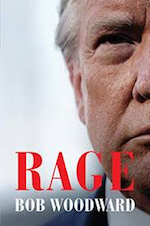 |
President Trump, our doting national father, was so worried that his children would get nervous and anxious about COVID-19 that he decided to spin a fairy tale about the big bad virus just vanishing into thin air. Bless his heart.
The tweeter-in-chief was aware of the seriousness of the COVID-19 threat right from the beginning, according to "Rage," an upcoming book by Washington Post journalist Bob Woodward.
Trump opted to lie to the American people by continually downplaying the threat and promising that it would just disappear when the weather got warmer.
He told Bob Woodward on Feb. 7 that the virus was “more deadly than even more strenuous flu.” But Trump minimized the threat in his public statements about COVID-19.
On his Feb. 25 trip to India, he called COVID-19 a problem that was going to go away and which he predicted “within a couple of days is going down to close to zero cases.”
The president on March 19 told Woodward that he misled the American people because he didn’t want to create a panic.
During the April 3 coronavirus task force meeting Trump said COVID-19 is going away, but two days later he told Woodward: “It’s a horrible thing. It’s unbelievable.”
Woodward conducted a series of interviews with Trump from December 5, 2019 to July 21, and the president consented to having the sessions recorded.
Though the recordings clearly show that Trump deceived the public about COVID-19, in the fantasy world of TrumpLand that is not lying to the public.
White House shill Kayleigh McEnany said on Sept. 9: “This president does what leaders do, good leaders. The President has never lied to the American public on Covid.”
Listen to the tapes, Kayleigh.
More than 185K Americans are dead from COVID-19. How many of them would be alive today, had the president come clean about the threat posed from the virus? How many of those dead didn't take the virus seriously because of Trump's apparent lack of concern about COVID-19?
Trump failed in his purpose of defending the American people. He gambled that the US could wall itself off from the pandemic.
The COVID-19 crisis came at an inconvenient time for Trump.
The initial reports of the COVID-19 outbreak in Wuhan, China were bracketed by the House impeachment of Trump on Dec. 18 and Senate acquittal on Feb. 5.
On the political and self-preservation front, a national healthcare emergency was the last thing that the president needed.
Instead of rallying the nation to fight the spread of COVID-19, Trump tried to wish it away. He lost that gamble and America is still paying a horrible price.
Big Business is not rallying around the president’s call to “decouple” the US economy from China, according to a poll of members of the American Chamber of Commerce in Shanghai.
The survey found that only four percent of respondents are relocating some manufacturing back to the US.
Nearly eight-in-ten (78.6 percent) of companies reported no change in China investment allocations from a year ago.
Trade tensions between the US and China may be the reason that only 28.6 percent of AmCham members plan to boost their investment in China, compared to 47.2 percent a year ago.
Trump's wish to make America the world's manufacturing superpower is a long way off.
Disney and Apple part ways on human rights in China. Disney faces criticism over filming part of its live-action remake of Mulan in Xinjiang, the region where China’s government has detained Uighur Muslims in mass internment camps.
The company thanks eight different government entities in Xinjiang for their assistance in putting together the film, according to the New York Times.
“Every big company in America needs to think about whether business is helping the Chinese government oppress the Uighur people,” said Tahir Imin, a Uighur activist based in DC.
Disney has the choice of cashing in on China’s booming box office that is soon expected to pass that of the US or working to promote human rights.
Apple, which has long been criticized for caving to censorship demands from China’s government, has now published a policy respecting “freedom of information and expression.”
The document claims Apple is “committed to respecting the human rights of everyone whose lives we touch—including our employees, suppliers, contractors and customers.”
The Financial Times noted the document tries to walk a fine line between maintaining rights while conceding that Apple “is required to comply with local laws in authoritarian countries.”
The test will come when China demands that Apple ban apps that help users evade censorship and surveillance.
Disney and Apple are high-profile global companies. The world watches and will emulate their human rights performance in China.


 The NBA, which promotes legalized gambling 24/7, seems more than hypocritical for banning player for placing bets... Diocese of Brooklyn promises to issue press release the next time one of its priests is charged with sexual abuse... Truth Social aspires to be one of Donald Trump's iconic American brands, just like Trump University or Trump Steaks or Trump Ice Cubes.
The NBA, which promotes legalized gambling 24/7, seems more than hypocritical for banning player for placing bets... Diocese of Brooklyn promises to issue press release the next time one of its priests is charged with sexual abuse... Truth Social aspires to be one of Donald Trump's iconic American brands, just like Trump University or Trump Steaks or Trump Ice Cubes. Publicis Groupe CEO Arthur Sadoun puts competition on notice... Macy's throws in the towel as it appoints two directors nominated by its unwanted suitor... The Profile in Wimpery Award goes to the Ford Presidential Foundation for stiffing American hero and former Wyoming Congresswoman Liz Cheney.
Publicis Groupe CEO Arthur Sadoun puts competition on notice... Macy's throws in the towel as it appoints two directors nominated by its unwanted suitor... The Profile in Wimpery Award goes to the Ford Presidential Foundation for stiffing American hero and former Wyoming Congresswoman Liz Cheney. JPMorgan Chase chief Jamie Dimon's "letter to shareholders" is a must-read for PR people and others interested in fixing America and living up to its potential... Get ready for the PPE shortage when the next pandemic hits... Nixing Netanyahu. Gaza carnage turns US opinion against Israel's prime minister.
JPMorgan Chase chief Jamie Dimon's "letter to shareholders" is a must-read for PR people and others interested in fixing America and living up to its potential... Get ready for the PPE shortage when the next pandemic hits... Nixing Netanyahu. Gaza carnage turns US opinion against Israel's prime minister. Trump Media & Technology Group sees Elon Musk's X as an option for those who want the free expression promised by Truth Social but without Donald Trump, owner of 57.3 percent of TMTG... Chalk one up for "anti-woke warrior" governor Greg Abbott as University of Texas lays off 60 DEI-related staffers... Five percent of Americans see the US as its own worst enemy, according to Gallup.
Trump Media & Technology Group sees Elon Musk's X as an option for those who want the free expression promised by Truth Social but without Donald Trump, owner of 57.3 percent of TMTG... Chalk one up for "anti-woke warrior" governor Greg Abbott as University of Texas lays off 60 DEI-related staffers... Five percent of Americans see the US as its own worst enemy, according to Gallup. Nine of the Top 100 firms that participated in O'Dwyer's rankings last year apparently threw in the towel for the 2024 scorecard. Seven other firms also went AWOL.
Nine of the Top 100 firms that participated in O'Dwyer's rankings last year apparently threw in the towel for the 2024 scorecard. Seven other firms also went AWOL.


 Have a comment? Send it to
Have a comment? Send it to 
No comments have been submitted for this story yet.